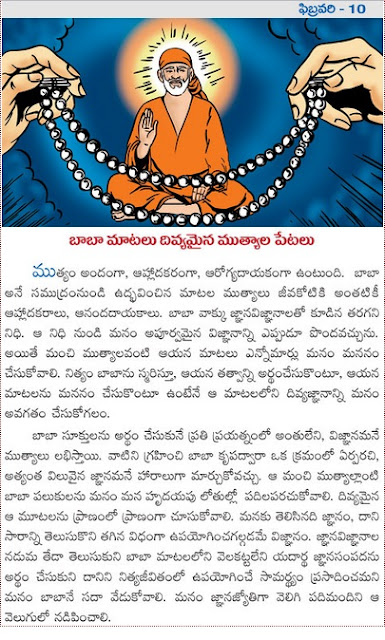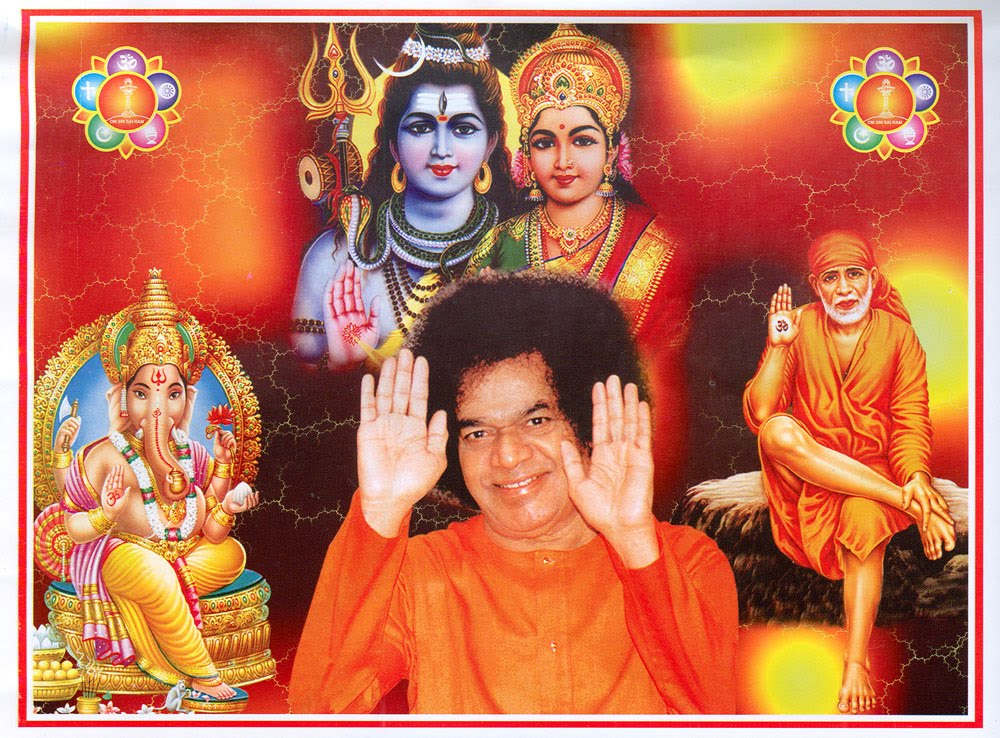Shri Shirdi Sai Speaks-10th Feb/The Bhagavad Gita for Children and Beginners-Chapter 1- Arjuna's confusion/Mr. Truthful |
| Posted: 09 Feb 2013 11:26 PM PST Om Shree Ganeshaya Namaha! Om Sai Ram ! Om Namah Shivaya! If for some reason you are not able to see , or download the below pictures or click to the below links and pictures- Plz go to http://debu7370.blogspot.com/ You can also have access to all the previous Shirdi Sai speaks mails at the above link.And if any of you would like to receive these messages directly to your mailbox everyday-- To request for Shri Sai Satcharitra books go to : http://www.saiseva.omsrisai.net/store/index.php For everything else related to Shri Shirdi Sai baba , go to http://debu7366.blogspot.com/ THE BHAGAVAD-GITA For Children and Beginners To read this from the very begining - Click Here To listen to the Hindi version mp3 of the Chapter 1 of Shri Bhagavad Gita-Click Here It is at this Battle field at Kurukshetra, the great discourse called the Gita was given by the Lord Krishna to Arjuna. The counseling given by Lord Krishna is not meant for Arjun alone. It is for the entire humanity. In this first chapter, The King Dhritarashtra inquired: Sanjaya, please now tell me, in details, what did my people (the Kauravas) and the Pandavas do in the battlefield before the war started?  CHAPTER 1 ARJUNA'S CONFUSION Jai: I would like to know first how Lord Krishna and Arjuna happened to talk on the battlefield, Grandma. Grandma: It came about in this way, Jai. The war of Mahabharata was about to begin after peace talks by Lord Krishna and others failed to avoid the war. When the soldiers were gathered on the battlefield, Arjuna asked Lord Krishna to drive his chariot between the two armies so that he could see those who were ready to fight. Seeing all his relatives, friends, and soldiers on the battlefield and fearing their destruction, he became compassionate. Jai: What does compassionate mean, Grandma? Grandma: Compassion does not mean pity, Jai. That would be looking down on others as poor, pitiful creatures. Arjuna was feeling their pain and their unlucky situation as his own. Arjuna was a great warrior, who had fought many wars and was well prepared for the war, but suddenly his compassion made him not want to fight. He spoke of the evils of war and sat down on the seat of his chariot, his mind full of sorrow. He saw no use in fighting. He did not know what to do. Jai: I don't blame him. I wouldn't want to fight either. Why do people fight, Grandma? Why are there wars? Grandma: Jai, there are not only wars between nations, but quarrels between two people, quarrels between brothers and sisters, between husband and wife, between friends and neighbors. The main reason is that people are not able to let go of their selfish motives and desires. Most wars are fought for possession and power. But all problems could be solved peacefully if people could see both sides of the problem and work out an agreement. War should be the last resort. Our holy books say: One should not commit violence towards anyone. Unjustified killing is punishable in all circumstances. Lord Krishna urged Arjuna to fight for his rights, but not to kill needlessly. It was his duty as a warrior to fight a declared war and establish peace and law and order on earth. We humans also have wars going inside all of us. Our negative and positive forces are always fighting. The negative forces within us are represented by the Kauravas and the positive forces by the Pandavas.The Gita does not have stories in it to illustrate the teachings, so will add some stories from other sources to help you. Here is a story about negative and positive thoughts fighting each other that Lord Krishna Himself told to Arjuna in Mahabharata. 1. Mr. Truthful There once lived a great hermit, who was famous for telling the truth. He had taken a vow not to lie and was popularly known as "Mr. Truthful." No matter what he said, everyone believed him because he had earned a great reputation in the community where he lived and did his spiritual practices. One evening, a robber was chasing a merchant to rob and kill him. The merchant was running for his life. To escape from the robber, the merchant ran towards the forest where the hermit lived outside the village. The merchant felt very safe because there was no way the robber could find out where he was hiding in the jungle. But the hermit had seen the direction in which the merchant went.The robber came to the hermit's cottage and paid his respects. The robber knew that the hermit would tell only the truth and could be trusted, so he asked him whether he had seen somebody running away. The hermit knew that the robber must be looking for somebody to rob and kill, so he faced a big problem. If he told the truth, the merchant would certainly be killed. If he lied, he would incur the sin of lying and lose his reputation. Any immoral act that may harm others is called sin. Ahimsa..(nonviolence) and truthfulness are two most important teachings of all religions that we must follow. If we have to choose between these two, which one should we choose? This is a very difficult choice. Because of his habit of telling the truth, the hermit said: "Yes, I saw someone going that way." So the robber was able to find the merchant and kill him. The hermit could have saved a life by hiding the truth, but he did not think very carefully and made a wrong decision. Lord Krishna's purpose in telling Arjuna this story was to teach Arjuna that sometimes we have to choose between a rock and a hard place. Lord Krishna told Arjuna that the hermit shared with the robber the sin of killing a life. The robber could not have found the merchant if the hermit had not told the truth. So when two noble principles conflict with each other, we have to know which one is the higher principle. Ahimsa has the highest priority, so the hermit should have lied in this situation to save a life. One may not tell a truth that harms a person in any way. It isn't easy to apply Dharma (or righteousness) to real life situations because what is Dharma and what is Adharma (or unrighteousness) can sometimes be very difficult to decide. In such a situation, expert advice should be sought. Lord Krishna gave another example of a robber coming to a village to rob and kill the villagers. In this situation, killing the robber would be an act of nonviolence because killing one person may save many lives. Lord Krishna Himself, on several occasions, had to make such decisions to win the war of Mahabharata and put an end to all the evil-doers. Remember, Jai, do not tell a lie, and do not kill any living being or hurt anybody, but saving a life comes first. Chapter 1 summary: Arjuna asked his charioteer friend, Lord Krishna, to drive his chariot between the two armies so that he could see the Pandava's army. Arjuna felt great compassion to see his friends and relatives on the opposite side, whom he must kill to win the war. He became confused, spoke of the evils of war, and refused to fight. Simran karo to Mann Sawar jaye... Sewa karo to Tann Sawar jaye... Kitni Dilkash hain hamare Satguru ki Baatein... Amal karo to Janam Sawar jaye. Quote of BABA: Knowledge of the Vedas, or fame as a great Gnani and mere formal Bhajan (worship) are of no avail unless, they are accompanied by Bhakti (i. e.,) devotion. |
































